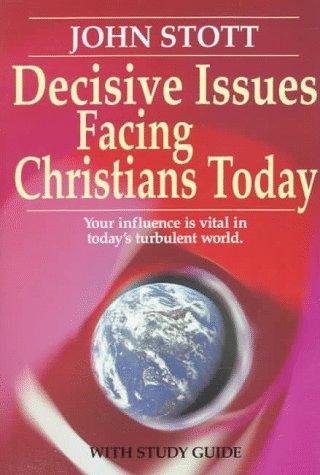Author:
John R.W. Stott
Date: 1984, 1990, 1996
Publisher: Marshall Morgan & Scott (1984), Marshall Pickering Collins (1990)
Length: 380 pages plus prefaces and study guide
Quote: “The Christian is at liberty to surrender neither to antiquity nor to modernity.”
John Stott was one of the most influential Christian writers in the world when I was in college. What may shock young people reading this book for the first time is that, just thirty years ago, Stott’s positions on nuclear disarmament, AIDS, homosexuality, abortion, euthanasia, environmentalism, South Africa, and women ministers were moderate and mainstream. For those of us who first read this book when it was new, it’s interesting to look back.
For U.S. readers, some of the more unexpected remarks will also be the ones that reflect the author’s British perspective. During the decade when our country was screaming about the possibility that a high school graduating class might invite a minister to give their Commencement speech and even say a prayer, the U.K. was still reconsidering a law that “made compulsory...religious instruction in the classroom” and only beginning to consider “the comparative study of different religions.” At a time when U.S. business owners were likely to try to smooth over a problem between a customer and an employee by saying, “With only two percent unemployment, what can you do?”, three million or more Brits were unemployed and anticipating that “the problem is going to get worse.” Stott was still describing the “Jane Roe” of Roe v. Wade as “a Texan lady” and, being more familiar with two-part family names than with two-part given names, collegially referring to the late civil rights activist as “Luther King.”
Many other things in this book, which was timely as a newspaper, are now useful mainly to show how much time has passed. Nelson Mandela was still in prison. Apartheid was still the law. Some Christians were still reluctant to presume that divorce could ever be a “forgivable sin”; Stott still found it necessary to explain, “I would not dream of expecting...an ill-treated wife to endure the ongoing cruelty of a psychotic husband...whether or not divorce and remarriage would be permissible, separation certainly would.” He was even liberal enough to concede that if people had divorced and remarried before conversion, the church should encourage them to be faithful in their current marriages, rather than demand that they go back to their first ones.
Now the real shocker is that the bases of the church’s doctrines have not changed. How much energy Christians outside the Republic of South Africa need to put into opposing apartheid is obviously a question that requires a new answer today. Christians also need to admit, by now, that efforts to “heal” homosexuality through counselling and behavior modification have disappointed most of those who tried them; for some Christians this has led to a belief that homosexuality may be natural and ethical for some people, for others to a belief that homosexual Christians need to practice self-control just like the rest of us who are tempted to promiscuity. But when Christians consider divorce as a question of church doctrine, nothing has changed. People have always been tempted to explore every possible alternative to celibacy and monogamous marriage; the Bible has always called them to monogamy; if there is any biblical basis for any church to recognize any other alternative, more of a case could be made for recognizing polygamous “marriage” than for recognizing same-sex “marriage.” Christians are not told to judge those who want to base their policy decisions on something other than the Bible, but, for those of us who want to base our doctrine on the Bible, successful marketing campaigns for nonbiblical alternatives have not changed what the Bible plainly says.
There is
some danger that, if young Christians read this book, they may change their
positions on certain issues. They may lose faith in a trendy, “feel-good”
position when reminded of what the Bible says on a subject. However, those
identified as the liberals in their churches should not rush to try to ban the
book. Real liberalism is all about tolerance for other points of view, even
when it hurts.
Up to the day when I post these reviews I never know which books to offer as Fair Trade Books...I knew Stott belonged to the older generation but only just saw online that he had died. (When I wrote the first draft of this review, he was still alive.) Sigh...Stott no longer needs the $1 that would be his share of $5 for the book + $5 for shipping, so feel free to buy this book from another web site if you find one that offers a better deal; probably you will.
Up to the day when I post these reviews I never know which books to offer as Fair Trade Books...I knew Stott belonged to the older generation but only just saw online that he had died. (When I wrote the first draft of this review, he was still alive.) Sigh...Stott no longer needs the $1 that would be his share of $5 for the book + $5 for shipping, so feel free to buy this book from another web site if you find one that offers a better deal; probably you will.

No comments:
Post a Comment